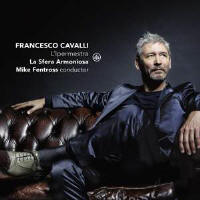Reviewer: David
Reznick
Since the Guardian Angel of
Tenafly and all points west has commanded that this recording materialize in
my mailbox, I am now the owner of 11 Cavalli opera recordings.
When I was an undergraduate at UCLA, I occasionally saw the name
of Cavalli in music history textbooks, usually on page 1, where, in the
interest of completeness, the first 500 years of Western music was
discussed. This position in the textbooks served to underline the fact that
Cavalli was dead. He wasn’t only merely dead, he really was sincerely dead.
Dead as Dracula and Bela Lugosi, combined. Dead as a letter from Amelia
Earhart to Judge Crater, sitting on a table at the Dead Letter office in
Deadwood, SD. Not just very sick; dead. I could have gotten tremendous odds
betting that he would be resurrected at any of the classical music betting
parlors that dot the streets of Las Vegas. He wasn’t even mentioned by
himself. His name was invariably linked to another composer, Marc’Antonio
Cesti, equally as deceased. Cesti and Cavalli, Cesti and Cavalli. Abbott and
Costello. Chang and Eng. Well, the world moved a bit, and now Francesco
Cavalli is a household name, like Betty Crocker and Uncle Ben. Hey, Cesti—it
could happen to you!
In my opinion (you don’t have to pay extra for it—free today only)
the first great opera ever written was L’Incoronazione di Poppea
(1643) by Monteverdi; and the second great opera was La Calisto
(1651) by Cavalli; and after that, opera embarked on a downhill spiral.
Anyway, those of us who bought shares in Cavalli Preferred from the first
offering can see that before too long all of Cavalli’s operas will be
recorded. This is an exciting prospect; for due to the musical shorthand of
the original scores, each conductor will have to prepare his performing
edition, and this sometimes leads to different versions of the same opera.
So far, the benchmark of what can be done with these early operas is shown
in the CD and video of René Jacobs’s La Calisto, in every respect the
finest opera recording I know.
Jacobs is a conductor whose name often comes up in discussion of
early music. Raymond Leppard is another. And now I’m delighted to include
Mike Fentross, the man behind the first recording of Cavalli’s
L’Ipermesta. (This is actually the second Cavalli-Fentross disc in my
collection: the first is La Rosinda, another winner. I imagine there
will be more. After all, a person who releases two Cavalli operas must be
hopelessly addicted, a seconda pratica junkie.)
Naturally, no composer maintains the same level of excellence throughout his
entire catalog, and so far, based on my burgeoning knowledge and
appreciation of Cavalli, I’d have to say that La Calisto is his
finest work. But each rediscovered opera casts its own spell, each has its
moments of heartbreaking beauty. And so it is with L’Ipermesta.
To gauge Fentross’s level of preparation and control, consider
that this entire three-hour opera was recorded at its performance, without
stopping (!!). And unless you knew this in advance, you’d never guess it.
This is partially responsible for the high level of interaction that
pervades the entire enterprise. The cast leaves nothing to be desired; and
unlike almost every live-performance CD I’ve ever heard, there is no
clomping around, no coughing, nothing to take one’s attention away from the
thing of beauty that is taking place before the audience.
The only thing I could mention that might be considered negative
is the fact that the libretto, included in the fascinating program notes, is
presented in Italian, but not in English. This is an important point, but
maybe not as serious as it might be in later operas, in which (remember,
it’s a matter of opinion) the story being told is not totally ridiculous, as
it unfailingly is in Baroque opera. This one, for example, tells the story
of two royal brothers, Daneo and Egitto. Sibling rivalry, as usual, raises
its ugly head: Egitto drives his brother and his entire family out of Egypt.
Making plans to recapture the throne, Daneo consults a seer, who tells him
that he will be killed by a son of his brother. So, master strategist that
he is, Daneo hatches a plan: He offers his 50 daughters (!) to be the brides
of Egitto’s 50 sons (!!!). Then, on their wedding night, the women will kill
the sons. What could go wrong? “Your honor, I put it to you—are these the
legs of a murderess? Or these? Or these? Or….” And this is just the
beginning. So it’s possible that leaving out the English translation might
be a blessing. Plus, the accompanying booklet is crammed with material as it
is. I have begun to discover an awesome bit of magic. Apparently, the older
the record shop customer is, the smaller the print gets in the booklet. I
just don’t know how they manage that.
Anyway,
keep them coming, Maestro Fentross! And, if you’d like to take a
Cavalli break, how about a bit of Cesti? Wikipedia cites his three most
successful operas as La dori, Il pomo d’oro, and Orontea.
I mean, if Cavalli comes, can Cesti be far behind?
Fermer la fenêtre/Close window
|




